|
With COVID-19 pandemic restrictions being lifted, people around the world are travelling again — some for the first time in two years. But this travel surge has caught airlines and airports off guard, resulting in long lineups, massive delays and cancelled flights. With vacation season well underway, it’s left many people frustrated with the state of airline travel.
Today in The Conversation Canada, John Gradek from McGill University answers some of the most common questions about airline industry chaos. Why are so many flights being cancelled or delayed? Are all the problems related to the pandemic? What can be done to prevent delays? Gradek takes a look at the airline industry from a global perspective to answer our pressing questions about the situation.
Also today:
All the best,
|

|
Eleni Vlahiotis
Editor
|
|
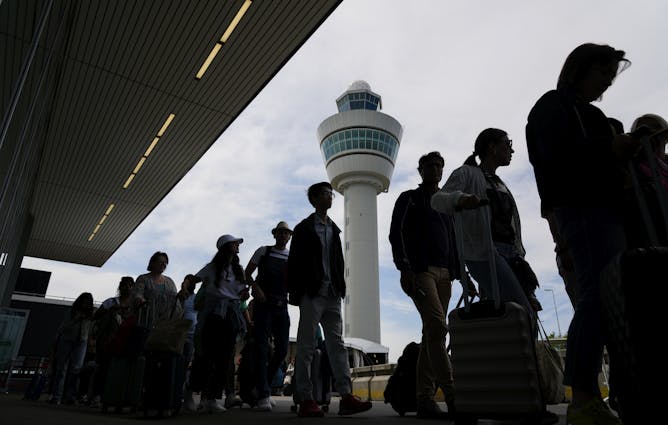
Travellers wait in long lines outside the terminal building to check in and board flights at Amsterdam’s Schiphol Airport on June 21. After two years of pandemic restrictions, travel demand is back with a vengeance, but airlines and airports that slashed jobs during the depths of the COVID-19 crisis are struggling to keep up.
(AP Photo/Peter Dejong)
John Gradek, McGill University
What’s behind the chaos at airports across Europe and North America? An airline industry expert explains the problems that have resulted in delays and cancelled flights.
|
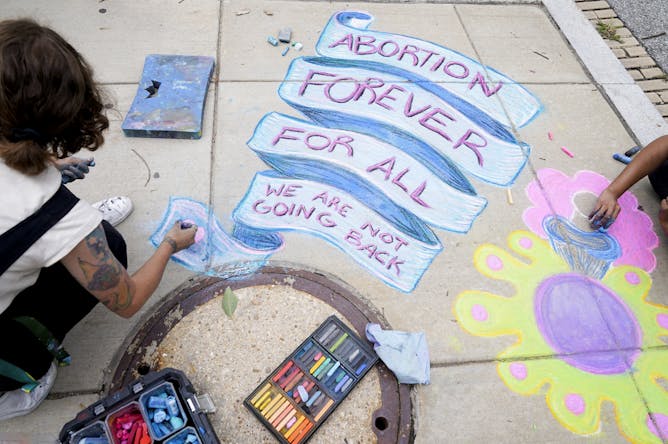
Abortion-rights activists draw on the sidewalk in Washington on June 24 following U.S. Supreme Court’s decision to overturn Roe v. Wade ending constitutional protection for abortion.
(AP Photo/Jacquelyn Martin)
Martha Paynter, Dalhousie University
There will no doubt be escalating rhetoric from anti-choice politicians in the wake of the fall of Roe v Wade . An abortion care provider says now is the time to improve abortion access in Canada.
|
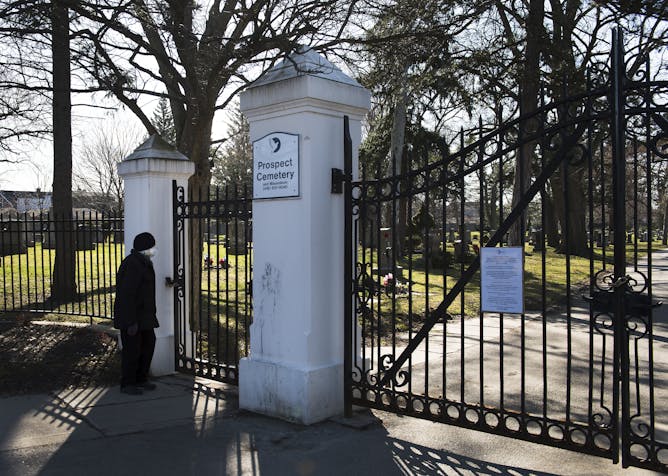
A woman looks through the locked gates at the Prospect Cemetery in Toronto in April 2020.
THE CANADIAN PRESS/Nathan Denette
Kathy Kortes-Miller, Lakehead University; Tara Lewis, Lakehead University
The pandemic has forced people to discover new ways of maintaining connection with one another and to consider their own mortality — obituaries played a part in making this easier.
|
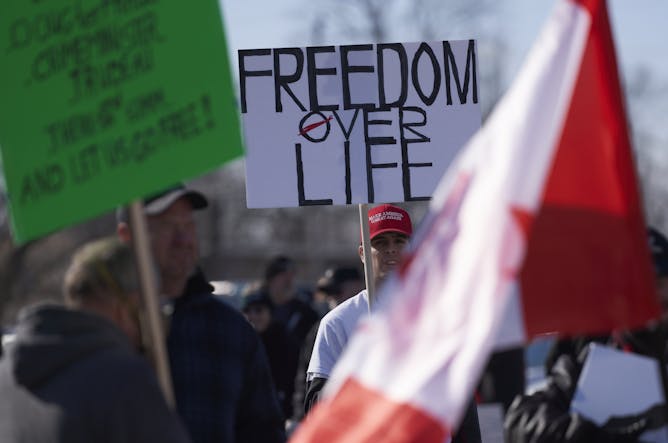
Anti-mask protesters hold signs during a demonstration against measures taken by public health authorities to curb the spread of COVID-19 in St. Thomas, Ont., in 2020.
THE CANADIAN PRESS/Geoff Robins
Cary Wu, York University, Canada; Alex Bierman, University of Calgary; Scott Schieman, University of Toronto
Trying to convince people to trust the basic institutions of Canada and each other is not enough. Economic divisions create a trust divide that threatens Canadians’ way of life.
|
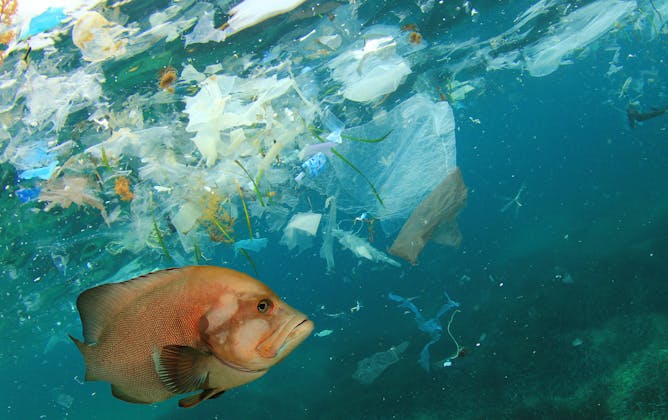
Smaller animals that feed lower in the food web might be at greater risk from microplastic exposure than larger ones.
(Shutterstock)
Garth A Covernton, University of Toronto; Hailey Davies, University of Victoria; Kieran Cox, University of Victoria
We need to advance our understanding of the effects of microplastics on aquatic ecosystems, especially on small animals at the base of food webs that might be ingesting more of these particles.
|
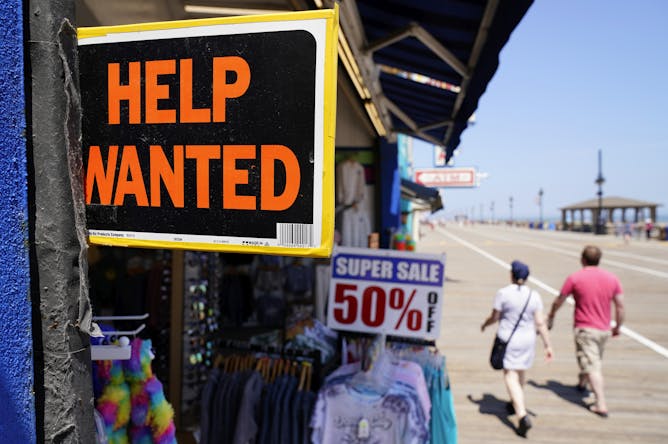
Many seasonal businesses are struggling to find enough workers again this summer.
(AP Photo/Matt Slocum)
Rebecca Raby, Brock University
Young workers are particularly vulnerable in the workplace because they tend to do short-term work, often lack training and safety education, and may see injury as just “part of the job.”
|
La Conversation Canada
|
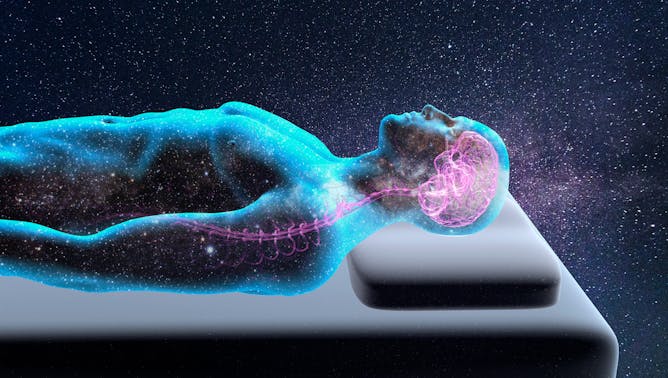
La plupart des gens ont du mal à se concentrer après une mauvaise nuit de sommeil.
(Shutterstock)
Barbara Jacquelyn Sahakian, University of Cambridge; Christelle Langley, University of Cambridge; Jianfeng Feng, Fudan University; Wei Cheng, Fudan University
Tant l’excès que le manque de sommeil peuvent perturber notre cognition.
|
Ukraine Invasion
|
-
Mark Webber, University of Birmingham
The next summit, against a backdrop of war in Ukraine, will be a test of Nato’s solidarity and sense of purpose.
-
Stephen Hall, University of Bath
A small piece of Russian territory on the Baltic coast has become the focus of heightened tensions on Nato’s fringe.
-
Matthew Sussex, Australian National University
There remains a significant danger the conflict falls off the international radar, or that Western leaders waver as the conflict drags on.
|
|
COVID-19
|
-
Jaime Sidani, University of Pittsburgh Health Sciences; Beth Hoffman, University of Pittsburgh Health Sciences; Maya Ragavan, University of Pittsburgh Health Sciences
With COVID-19 shots finally available for infants and preschoolers, knowing how to combat misinformation on social media and elsewhere could be more important than ever.
|
|
Culture + Society
|
-
Jacob Sunter, University of Adelaide; Mandy Treagus, University of Adelaide
New York’s tiny Fire Island, featured in the new rom-com film of the same name, has a long history as a haven for gay people.
|
|
Health
|
-
Agne Suziedelyte, City, University of London; Anna Zhu, RMIT University; Silvia Mendolia, University of Wollongong
Gender differences were more significant in lower-income families.
|
|
Politics
|
-
Stefanie Lindquist, Arizona State University
State supreme courts have a relatively low profile in the US. That’s going to change now that they will be under political pressure to decide whether abortion is protected in state constitutions.
|
|
|
|
| |
| |
| |
| |
|
|